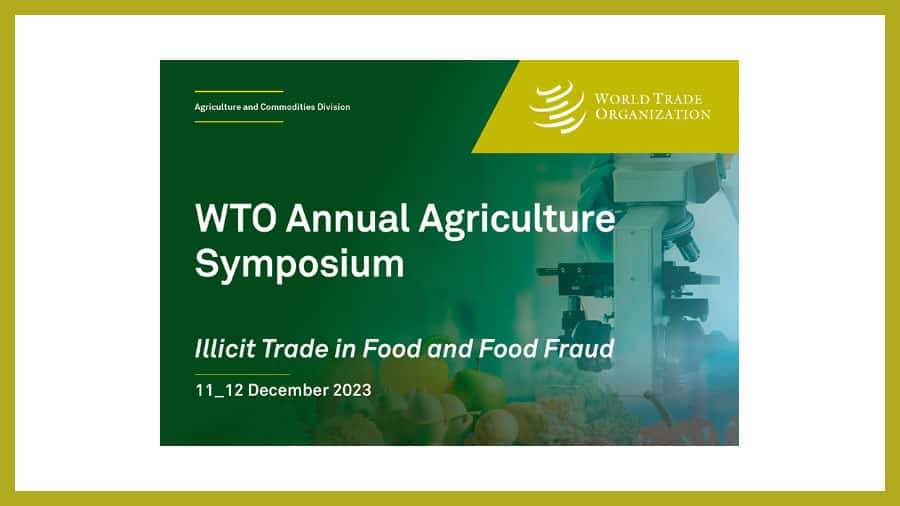Join us to gain perspective on how the World Trade Organization (WTO) considers its role in food fraud prevention through trade rules. I will be a presenter in the Food Fraud and Emerging Issues and Future Trends session. International trade agreements are essential for food fraud prevention.
- LINK TO WATCH LIVE (December 11 at 10 am USA ET): https://www.youtube.com/live/tWY7XIvYsUc
- Reference: WTO, World Trade Organization, Annual Agriculture Symposium “Illicit Trade in Food and Food Fraud,” Day 1 Session on Food Fraud and Emerging Issues and Future Trends, December 11, 2023; 10 to 11:30 am USA Eastern Time/New York (16:00-17:30 local time), https://www.youtube.com/live/tWY7XIvYsUc
I am pleased to be invited to present at the WTO Second Annual Agriculture Symposium, “Illicit Trade in Food and Food Fraud.” This is the second year I’ve presented at this event. I return with other panelists including Quincy Lissaur of SSAFE and Jeff Hardy of TRACIT.
Here are several conclusions the WTO host provided as a summary of the presentations from last year’s event:
- “With every step the WTO takes to open trade, the WTO reduces the incentives for fraud, making illicit trade less lucrative.”
- “Nothing would be ‘illicit’ if we [WTO and countries] did not have a benchmark for what is ‘licit.’”
- “In trade law, that benchmark are WTO rules, and all of the regional and national trade laws, rules and regulations that flow from it.”
The WTO’s conclusion emphasis was on the WTO trade rules being “applied correctly” in terms of countries applying resources for inspection, enforcement, and prosecution, as well as investment in technology that supports effective communication and coordination between countries.
Defining an action or a product as illegal – and getting agreement from the importer and exporter to the rules – is a first step. The second and even more challenging step is to get resource allocation when competing versus other more hazardous priorities (e.g., drugs/ guns/ violence, human trafficking, etc.). It is naturally much more of a direct help for a country’s customs officers to focus on harmful products being imported into their country (and harming their own citizens and neighbors) rather than spending scarce resources on products exported to other countries.
It is incredibly important for these types of events and conversations to occur. When there is open discussion, we can all find our optimal contribution to food fraud prevention. Sometimes, a group will be efficient by doing less or changing their focus.
Takeaway Points
- Stay aware of the global activities in food fraud prevention, including listening to the WTO Annual Agriculture Symposium “Illicit Trade in Food and Food Fraud.”
- Food fraud prevention is a complex concept, and each stakeholder has a unique and optimal role to play.
- For all food fraud prevention – and a broader product fraud prevention – there are many challenges, such as resource allocation and the translation of laws into actually reducing crime.
Reference: WTO, World Trade Organization, Annual Agriculture Symposium “Illicit Trade in Food and Food Fraud,” Meeting home page: https://www.wto.org/english/tratop_e/agric_e/agri_11122023_e/agri_11122023_e.htm
Panelist: Day1 Session on Food Fraud and Emerging Issues and Future Trends, 10 to 12:30 am USA Eastern Time/New York (16:00-17:30 local time), https://www.youtube.com/live/tWY7XIvYsUc

